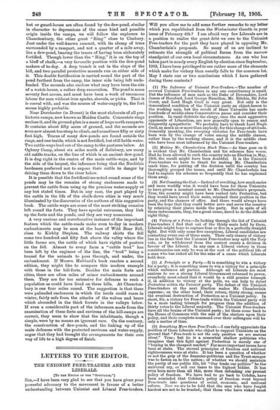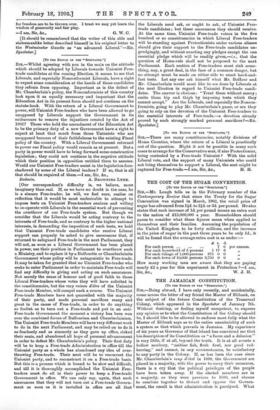[TO TIM EDITOR OP TIM 'SPECTATOR."]
issue of February 4th P I am afraid very few Liberals are in a position to realise the great debt we owe to the Unionist Free-traders for the part they have played in opposing Mr. Chamberlain's proposals. So many of us are inclined to estimate the strength of political forces from the narrow standpoint of our own local circumstances. As one who has taken part in nearly every English by-election since September, 1903, I have been privileged to see rather more of the elements which make for victory than usually falls to the common lot. May I state one or two conclusions which I have gathered during these contests P
(1) The Influence of Unionist Free-Traders.—The number of avowed Unionist Free-traders in any one constituency is small. But the influence of men such as the Duke of Devonshire, Lord James of Hereford, Lord George Hamilton, Mr. Ritchie, Sir John Gorst, and Lord Hugh Cecil is very great. Not only is the demoralised condition of the Unionist party an object-lesson to the working man, but the revolt of these Unionists has made hundreds of middle-class Conservatives pause and consider their position. In rural districts the clergy, once the most aggressive opponents of Liberalism, are now generally open to reason and frequently sympathetic. We probably have to thank Lord Hugh Cecil, as much as or more than anybody, for this change of attitude. Generally speaking, the sweeping victories for Free-trade have been won by the change of votes among the middle classes, rather than by the working classes, and it is the middle class who have been most influenced by the Unionist Free-traders.
(2) Making Mr. Chamberlain Mark Time.—As time goes on it is evident that Mr. Chamberlain and his schemes fare worse. Had he been allowed to rush the country into an Election in May, 1903, the result might have been doubtful. It is the Unionist Free-traders we have to thank for making Mr. Chamberlain mark time, for putting off the decision until the country has thoroughly grasped the issues, and until Mr. Chamberlain has had to explain his schemes so frequently that he has explained them away.
(3) Not Counting the Cost.—Instead of revolting, how much easier and more worldly wise it would have been for these Unionists to have given a nominal assent to Mr. Chamberlain's proposals. True, the country might have been rushed into Protection, but they would have saved their seats, retained their position in the party, and the chances of office. And there would always have been the hope that they could better save and serve the country by retaining their places inside the party. But in spite of all these inducements, they, fora great cause, dared to do the difficult right thing.
(4) Victory at a Price.—In looking through the list of Unionist Free-traders I find that out of the thirty seats held by them, Liberals might hope to capture four or five in a perfectly straight fight. But with only some five exceptions, Liberal candidates are contesting every one of these seats. Their only chance of victory lies in the fact that the Unionist Free-traders may split the Tory vote, or by withdrawal from the contest create a division in favour of the Liberal. In any case a Liberal victory in these constituencies can only be won at the cost of the political life of a man who has risked all for the sake of a cause which Liberals hold dear.
(5) A Principle or a Party.—It is something to win a victory for a party; it is something more to win a victory for a principle which embraces all parties. Although all Liberals are most anxious to see a strong Liberal Government returned to power, everybody must admit that it would be a still greater triumph if, in addition to victory at the polls, we can help to defeat Protection within the Unionist party. The defeat of the Unionist Free-traders at the next Election makes Mr. Chamberlain supreme; on the other hand, their return, thirty strong, means the eventual destruction of Protection as a Unionist policy. In short, Sir, a victory for Free-trade within the Unionist party will be a more lasting triumph for progress than the addition of thirty votes to the Liberal majority. The Unionist Free-traders have all the brains of the Unionist party ; let them come back to the House of Commons with the seal of the electors upon their policy, and their complete command over their colleagues will be only a matter of time.
(6) Something More than Free-Trade.—I can fully appreciate the position of those Liberals who object to support Unionists on the ground that "Free-trade is not the on/y question we are anxious about." True; • but he is a somewhat shallow politician who imagines that this fight against Protection is merely one of "buying in the cheapest market." Far more important issues have been at stake. The eternal principles of freedom and national righteousness were at stake. It has been a question of whether or not the grip of the financier-politician and the Trust-monger was to fasten on to the nation; of whether we should maintain the purity of our public life, let "Our trade our politics" be the universal cry, or sell our taxes to the highest bidder. It has even been more than all this, more than defending our present policy of freedom. We have had to go back to Cobden, have been reminded that Cobden's policy of freedom .went beyond Free-trade into questions of social, economic, and national reform. Now we are to be told that the men who have fought hardest are not to be trusted; that those who have risked most —I am,. Sir, &c., G. W. C.
the Westminster Gazette as "an advanced Liberal."—En. Spectator.] [To THE EDITOR OP THE ..SPECTAT013.1







































 Previous page
Previous page